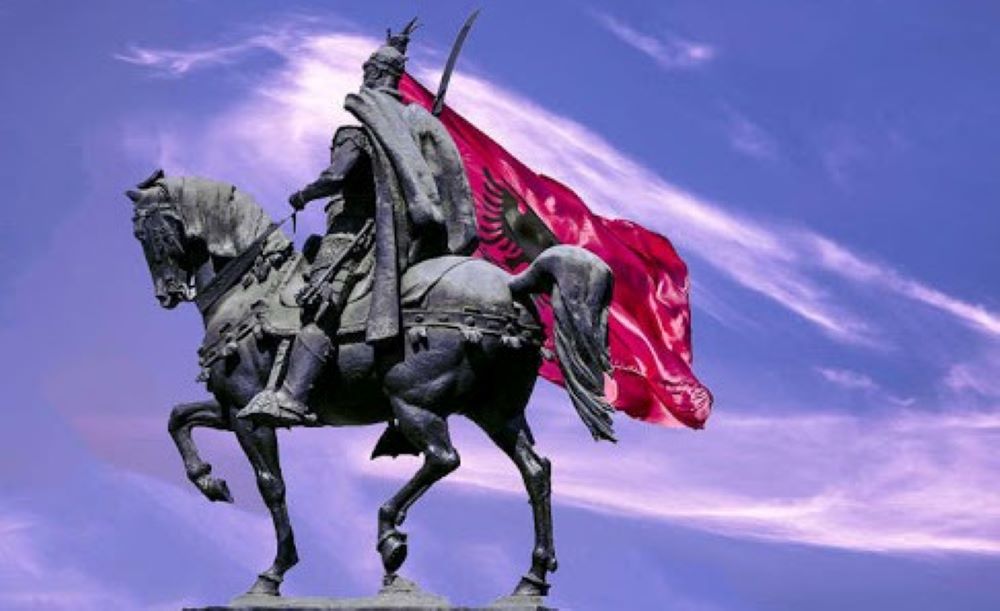This is one of the moments of enlightenment, when people are reminded to take refuge in nationalism. Memories of values are conveyed, but also how nationalism unites us in times of peace or when unforeseen enemies appear in front of us, just as in the case of Covid-19 pandemic.

Ben Andoni
Meanwhile Albania and northern Macedonia wait endlessly in the Brussel lobbies for the membership procedure, essentially a bitter bureaucracy, Europe has the opportunity to see in reality Kafka’s parable of the “Gates of Law”. If not in the case of Albania, which let much of its pride go for the sake of integration, its eastern neighbours negotiated even their identity.
It seems this does not give any different chance to nationalism in Albania. Those few pathetic nationalists, who raise the so-called issue of “Greater Albania”, look like they have emerged from history texts, when the country was not yet shaped as a state; just like politicians when they try to threaten with impossibility. The latter, makes today’s politicians unreliable to Brussels and even to the citizens. All in all, a government like the one in Albania, in order to enjoy a third term of governing the country, should assure the leadership, the credibility that comes from below. It is precisely the community of people with their historical unity and identity that gives legitimacy to the work of a government. But this cannot be the case of Albania at all, which unfortunately conveys a deep division of the Left and the Right. Moreover, the division is so big that the city and the laws made there are almost impossible to perceive in rural areas. The electorate, which nowadays paradoxically sustains and nurtures this political elite, in many cases is not clear when it delegates the vote for its representatives, which detach themselves from the electorate and no longer represent it. It already belongs to the identity of the party leaders who, as per the electoral system, govern the country. Nowadays…” Fractional interests establish parties whose purpose is no longer to govern to the interest of all, but to plunder for the sake of the group”, writes Roger Scruton in the essay “The Need for Nations”.
This is one of the moments of enlightenment, when people are reminded to take refuge in nationalism. Memories of values are conveyed, but also how nationalism unites us in times of peace or when unforeseen enemies appear in front of us, just as in the case of Covid-19 pandemic. Facing the pandemic, Albania and other small countries, experienced the missing solidarity, or what it meant to tolerate at the expense of nationalism for the sake of common values, which disappeared as if they never existed. And, the Albanian government, just like many others, asked the citizens to make sacrifices without saying that it was needed for the values of Europe and even more for Brussels, whose coldness Albanians can feel to their bones today. Our identity kept us safe when we associated it with the nationalism.
Anyone facing this challenge today calls on his/her national feeling, within which play the measures of general human empathy of sacrifice for the sake of others, just that mental habit which social democracies do not normally encourage.
All this indecisive behaviour, where we show up and withdraw from nationalism, carries that great danger to our vulnerable sections of society, in front of whom we pass so indifferently, or what John Ralston Saul calls “positive nationalism” – which in fact is related to the concerns of the people of a country about national identities and shows the efforts made by marginalized social entities to conform to the rules, which we are required to have according to the rules of Brussels, but, deep in our heart, we feel that it is better to follow those of positive nationalism, when we lived and were really integrated together.
This is perhaps the good thing about nationalism, which probably we will approach again these times … even without the fear of Brussels
Ben Andoni has written for many of the Albanian daily newspapers and has been the editor in chief of some of them. Nowadays, he is engaged in political and regional analysis



Leave A Comment